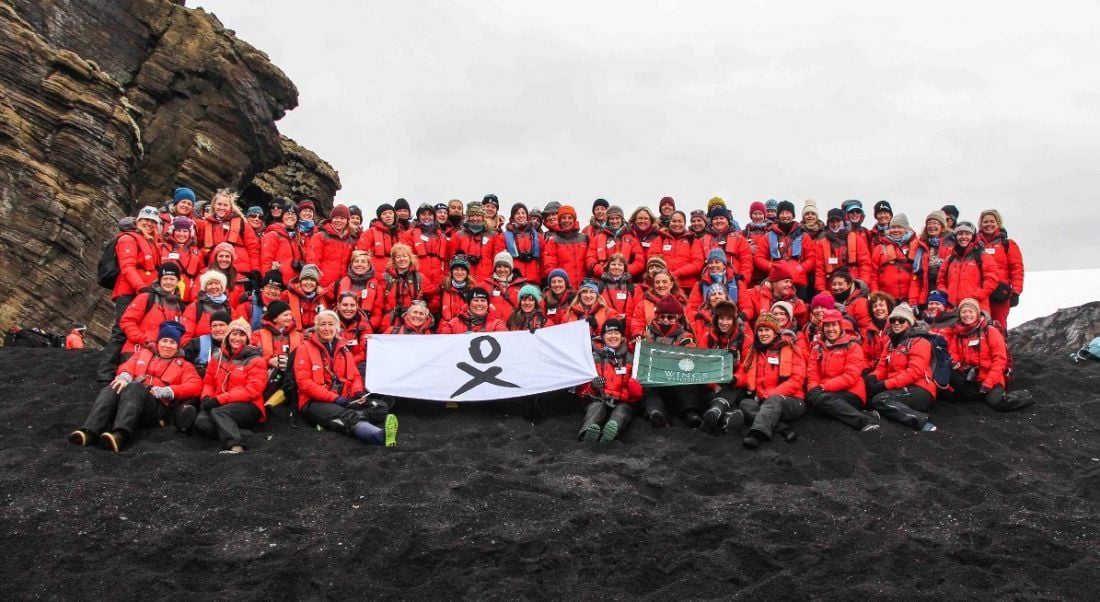A journey to the southernmost continent in the world made by 76 women in science aims to change the face of leadership.
On 2 December, the largest all-female expedition to Antarctica set sail from Argentina.
76 women began the voyage, which was just shy of 20 days, to the southernmost continent of the world – all in the name of promoting women in science.
The expedition was organised as part of the Homeward Bound Initiative, which aims to “heighten the influence and impact of women with a science background in order to influence policy and decision-making as it shapes our planet”.
The project was the idea of leadership activist Fabian Dattner and Antarctic marine ecological modeller Jessica Melbourne-Thomas.
After six months of collaboration and gaining support from scientific bodies and influential women, the project went viral at the end of 2015.
The 76 women selected for the all-female expedition included astronomers, engineers, physicists, science communicators, Antarctic and Arctic specialists, doctors and social scientists.
Co-founder Dattner said the expedition “significantly elevates the profile of the women and creates a global discussion through media on why women at the leadership table matter.”
With a huge level of media coverage, there’s no doubt that it succeeded in raising the profile of women and created an important discussion.
But what happened on the trip itself? What was in store for the 76 women on their 19-day voyage?
Journey to the edge of the world
Dattner said it was a scientific symposium at sea: “Every woman sharing what she does and why as a scientist, with supported coaching on science communication.”
There were 16 landings, including two base visits in the US and Argentina, as well as a major collective art project based on Joseph Campbell’s The Hero’s Journey.
But the major component of the trip was leadership awareness. This involved the women understanding themselves, their purpose, their values and their impact.
“This may sound obvious,” said Dattner. “But the stories women tell themselves, no matter how clever they may be, often limit their influence. They serve so many – families, communities, workmates – that they end up losing their sense of self ie they take on too much work, serve too many people and find it hard to say ‘no’.”
The whole expedition was filmed as part of a documentary funded by Good Pitch – an interrogation into leadership through the eyes of women.
The women also took part in important discussions about climate change, women in science and what it takes to lead in this context.
With so many positive goals setting out, Siliconrepublic.com asked Dattner how well she thinks they succeeded.
‘The 2017/18 project will be an absolute rocket’
– FABIAN DATTNER
“I am probably toughest on this, on myself. I think we probably scored a seven out of 10 for the first trip, all things considered,” she said. “Now, having done a faculty review and been peer reviewed by 76 women with a science background, the 2017/18 project will be an absolute rocket.”
Dattner talked about the importance of bringing women into leadership roles, particularly in science areas. “In science, on average [women] have 9pc of leadership roles globally. Common sense, not common practice, despite the facts.”
The fact is that women can be better in leadership roles than men due to a variety of factors. Four critical pieces of research conclude that women are more collaborative, more inclusive, have a legacy mindset and can be trusted with assets.
These are just some of the core reasons that the largest all-female expedition to Antarctica was necessary. However, there is still unconscious bias about women in the industry and women in general. Groups consisting only of women have long had assumptions made about them.
In 1969, Sylvia Earle led the only female expedition of 20 ‘aquanaut’ teams in the Tektite project. “It was anticipated they would be bitchy, fight and not get on,” said Dattner. “In fact, they required no specific leadership, got on without a hitch, and did 20pc more underwater research than the 19 male teams.”
Dattner said hers was a beautiful crew that was immensely helpful and became a family. She admitted to being “a little star-struck by the brainpower”.
Homeward Bound’s next all-female expedition is set to go in February 2018 and applications are open until 20 February 2017.
Updated, 09.32am, 30 January 2017: A concept trailer was removed at the request of Homeward Bound.
Looking for jobs in tech or science? Check out our Employer Profiles for information on companies hiring right now and sign up for our Career Republic e-zine for a weekly digest of sci-tech careers news and advice.




